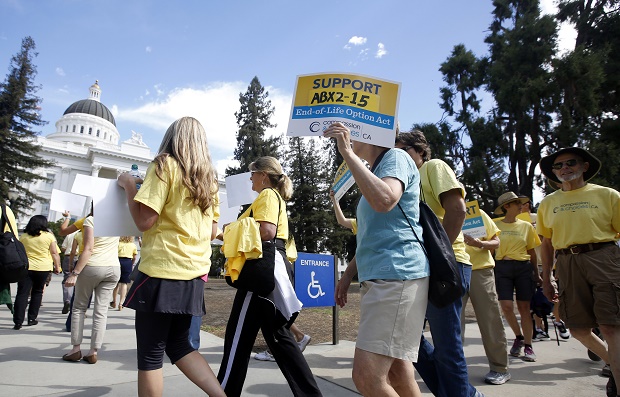
Supporters of a measure to allow the terminally ill to end their own life march at the Capitol while calling on California Gov. Jerry Brown to sign the bill Thursday, Sept. 24, 2015, in Sacramento, California. The measure, approved by both houses of the Legislature, faces an uncertain future with Brown, a former Jesuit seminarian, who has not said whether he will sign it. AP
SACRAMENTO, California — California ends its legislative season having enacted some of the country’s most aggressive social policies: Laws requiring student vaccinations, granting terminally ill people the right to take life-ending medications, and mandating equal pay for women were among dozens approved.
The range of sweeping new laws in the most populous state reflects legislators’ desire to set a national trend on progressive social and environmental issues while sidestepping more thorny economic matters.
Many interest groups and politicians see California as the brass ring for setting policies — and then testing whether those policies can withstand rigorous challenges.
“Both the vaccine bill and the right-to-die legislation will be seriously looked at by other states,” said Sherry Bebitch-Jeffe, senior political science fellow at the University of Southern California. “If it can pass here and it is perceived to work here, I think the proponents have a big positive jolt out of the victory in California.”
She believes over the next five to 10 years, the nation will look more like California both demographically and politically.
Gov. Jerry Brown, a lifelong Catholic and former Jesuit seminarian, ended months of speculation when he signed the hotly debated right-to-die law, saying he doesn’t want to deprive the terminally ill of that option.
Advocates pushed for such laws in at least two dozen states this year following the highly publicized death of activist Brittany Maynard, a California woman with terminal brain cancer who moved to Oregon to legally end her life.
READ: California lawmakers approve right-to-die legislation | Right-to-die backers say California helps fight elsewhere
The legislation faltered elsewhere, but advocates hailed the California win as their most significant. They called it the “biggest victory for the death-with-dignity movement since Oregon passed the nation’s first law two decades ago.”
With the worst of the state’s budget crisis behind them, Democratic lawmakers who control both houses of the Legislature are free to resume a liberal agenda of extending protections to the most vulnerable. But they lack the critical two-thirds majority required to approve tax increases or fees.
Brown won approval for robust climate change legislation. But Republicans and moderate Democrats who are a growing force in the state capital successfully stripped it of a mandate to cut oil use in California by half within 15 years, marking a rare defeat for the 77-year-old governor.
The new law requires the state to get half its electricity from renewable sources by 2030, continuing California’s “leadership in terms of social and environmental issues,” said Larry Gerston, a professor emeritus at San Jose State University.
Similarly, several states already are examining equal pay legislation after its passage in California.
“It’s the panoply of issues that California, if not in a leadership position, is always close to it,” Gerston said. “The various voices are represented here much more, in more forceful ways.”
Despite the Legislature’s liberal bent, the year also marked another win for business interests, who defeated 18 of the 19 bills the Chamber of Commerce dubbed “job killers.” Besides stripping the climate bill of an oil mandate, they again stymied efforts to tax tobacco and oil, and opted not to alter the state’s landmark property tax limitation law.
In all, lawmakers sent Brown 808 bills, and he signed 675 of them. Other major new laws include:
— Automatically registering all eligible voters when they get or renew their driver’s license in an effort to boost voter turnout.
— The strictest rules in the nation to ban routinely giving antibiotics to livestock.
— The first law to specifically ban using the name “Redskins” for school sports teams.
— Barring most people with concealed weapons permits from taking weapons onto college campuses.
Lawmakers also put off dealing with some of the more politically vexing issues that confronted them, such as a $59 billion backlog in road maintenance and a $1 billion shortfall in Medi-Cal, the state’s health insurance program for the poor.
Those problems won’t be any easier to solve in 2016, an election year, but there’s always the ballot box. State officials are reviewing at least 80 proposed ballot initiatives.